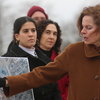Flying Dutchman seeks direction in sea of competing ideas
The Enterprise — Melissa Hale-Spencer
“Mind maps,” filled with residents’ ideas on effectively using excess space at Guilderland’s schools, cover tables Tuesday night as, in the background, at right, the school board discusses what directions to explore. The mind maps, generated at a Nov. 19 summit, are posted on the district’s website at guilderlandsschools.org.
GUILDERLAND — “An ocean of white paper,” as the superintendent put it, covered the tables of the meeting hall while the school board on Tuesday deliberated over what direction to take.
The district held a summit on Nov. 19 to tap the ideas of 74 volunteers on how to solve the problem of too much space for too few students. The long sheets of paper were “mind maps” left by the residents who participated, jotting their thoughts on redistricting, regrouping grade levels, repurposing buildings, or closing schools.
Over the course of an hour and a half on Tuesday night, the nine board members gave a range of impressions from the summit comments with Gloria Towle-Hilt summing up the discussion, suggesting that small groups be formed to each look into a series of topics, including: repurposing, closing a school, hosting pre-kindergarten classes, examining school-town relationships with an eye to helping each other move forward, and questioning data from a consultant’s report.
“I think it’s a complete list,” said board member Colleen O’Connell.
“It’s a very ambitious list,” responded Superintendent Marie Wiles.
“We’re not in a hurry,” said board member Jennifer Charron.
“I think we are,” countered the board’s president, Barbara Fraterrigo.
Wiles said, for example, to look at closing an elementary school, “We would rebuild the budget under five different analyses…To do it justice is not a quick analysis.”
The board’s vice president, Allan Simpson, then said consideration should be given to more than closing one of the five elementary schools. He suggested making a junior-senior high school, freeing up the middle school for elementary students, allowing the district to close several elementary schools.
“Then you’re affecting the philosophy of education,” countered Towle-Hilt, a retired middle-school teacher.
Board member Christopher McManus referenced an analysis by Paul Seversky, the consultant hired by the district. Seversky released his report in June, stating that pupil capacity at the district’s elementary schools is under-utilized by about 14 percent; at the middle school by about 25 percent, and at the high school by about 25 percent.
Seversky’s report concluded with six scenarios; four of them involved closing Altamont Elementary School and one involved closing Lynnwood Elementary for a savings of between $1.2 million and $2 million annually. The sixth would have maintained the status quo — five elementary schools, a middle school, and a high school — at no savings.
The report stirred strong protests from the village of Altamont, and, in August, the school board voted, 7 to 2, to set aside the scenarios.
At Tuesday’s meeting, McManus said a failure of Seversky’s study was to advise closing a school as a first recourse. McManus recommended looking at repurposing before considering closing a school.
“If that doesn’t work, go to closing a school,” he said.
Several board members pointed out that regrouping classes or redistricting wouldn’t realize any savings unless a school were closed.
“When you repurpose a school, the money has to be enough to cover a budget deficit,” said Fraterrigo, noting that one summit participant maintained 40 classrooms would have to be leased to bridge the annual budget gap.
“Let’s find out,” said Towle-Hilt.
In recent years, Guilderland has had to close multi-million-dollar budget gaps; the district has cut 227.6 posts since 2009. The budget gap for next year is projected at about $129,000, largely because retirement contributions are less, but district administrators have said this reprieve will be short-lived.
Wiles said at Tuesday’s meeting that the district’s communication committee, which meets on Friday morning, will discuss ways to structure a group or groups that can investigate repurposing school space. She said that, in addition to community members, staff must be included. “They live the reality,” said Wiles.
McManus, who was the first school board member to speak at Tuesday’s meeting, said from the start he’d like to head a group to consider housing pre-kindergarten programs in Guilderland schools. He recommended looking at districts that have done so.
Both Towle-Hilt and Fraterrigo suggested looking at leasing space for adult day-care programs. Fraterrigo said there is a “crying need” for adult day care in the area and stated, “The relationship between the elderly and children is a beautiful thing to see.”
Resident Bridget Scally, who spoke at the end of the meeting, supported the idea. She described herself as a member of “the sandwich generation,” taking care of both young children and elderly parents.
“Don’t look at adult and pre-K as two different things,” she advised the board. The Teresian House, she said, offers care for both the elderly and for preschoolers, allowing parents to drop them off and pick them up together. She couldn’t get into the Teresian House program because it was filled, Scally said, indicating there was a need for more such programs in the area.
Board member Christine Hayes read from an email she had sent in April recommending start-up businesses be housed in the schools so students could gain real-world hands-on experiences. She noted that a school, by law, can’t take lease money from for-profit commercial enterprises but said the businesses may well stay in town once they turn a profit and so would enrich the community and increase the tax base.
Board members disagreed over whether Guilderland had sufficient commercial development. Catherine Barber pointed to Crossgates Mall and expansions and upgrades at Hamilton Square and Stuyvesant Plaza, among others, while McManus said 14 businesses on Western Avenue were “completely gone.”
“Even the psychic has closed,” he said.
Just because a business isn’t there anymore doesn’t mean there aren’t plans for a parcel, said Barber. Barber, whose husband chairs the town’s zoning board, said she followed those meetings.
O’Connell, who said her husband was the counsel for the town’s Industrial Development Agency, disagreed with Barber and said the IDA “chose not to” use it for economic development.
Towle-Hilt suggested, instead of arguing, “We could get the data.”
Several board members said the district should be marketed. Fraterrigo advised advertising in foreign press for students “to come here and pay tuition.”
Jennifer Charron said, “I had a long conversation with Ken Runion.” She said that Runion, Guilderland’s supervisor, told her, “The town’s not doing anything to market the district. That’s the chamber’s job.”
Like Fraterrigo, Charron also advocated creating a local foundation to fund school costs, an idea the board has broached for years but found untenable. Charron said she advised people, “Put your money where your mouth is and put your butt on this committee.”
James Gaughan, the mayor of Altamont, who has been outspoken about keeping the village school open, and has been a strong proponent of housing pre-kindergarten classes in the schools, spoke to the board at the end of the meeting. He said he was glad that early childhood education was being considered and urged, “I look forward to a timeline.”
Assistant Superintendent for Business Neil Sanders said early on it would be “a tremendous amount of work” to analyze the potential closing of five school buildings. “Our preference,” he said of administrators, “would be to narrow it down as much as possible.”
“No disrespect to Neil,” said Simpson, “but we need to look at a lot of different options.” He also said, “The worst thing you can do is make no decision. That just shows a lack of leadership…To talk about days on, months on, years on is the wrong path.”


